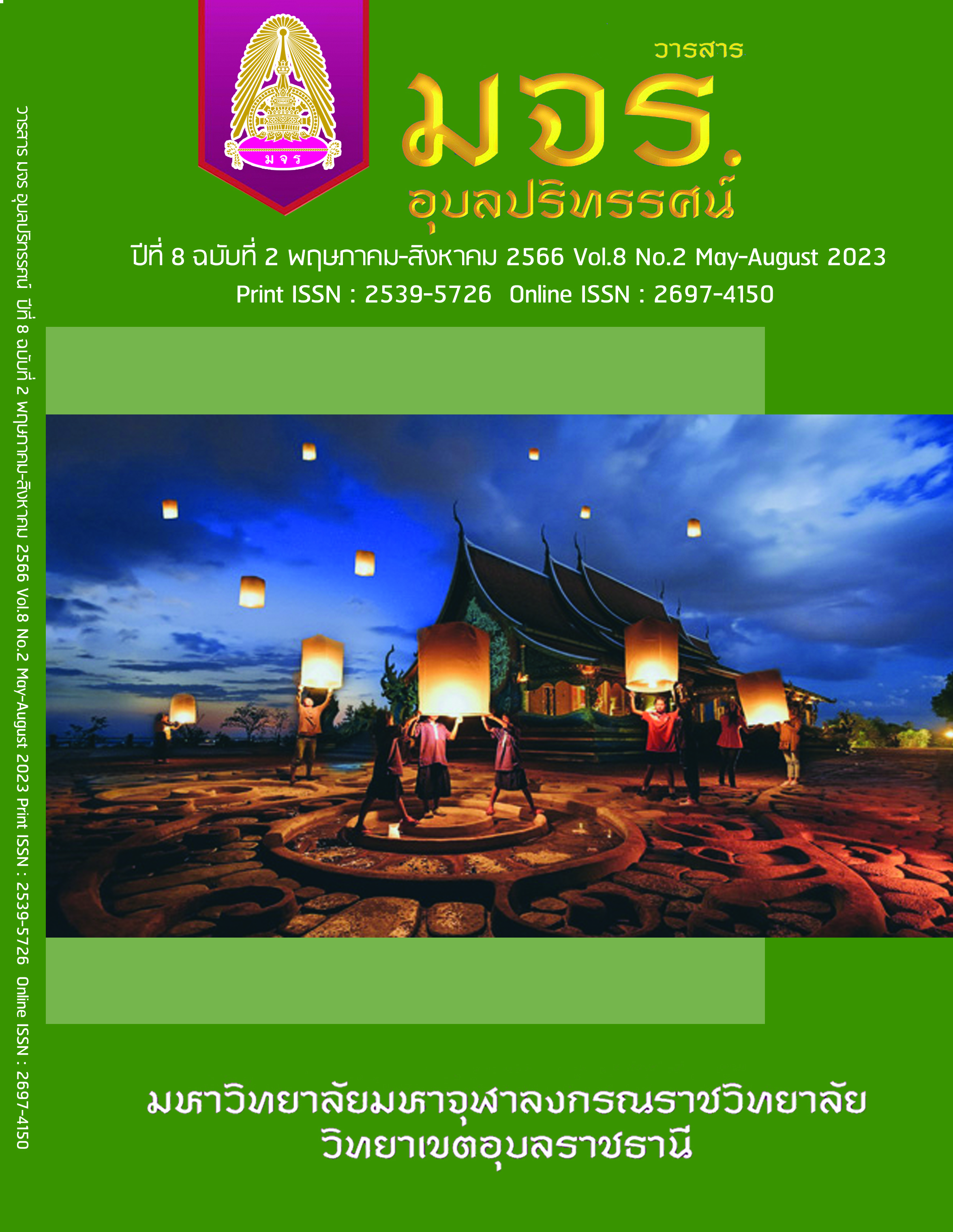การปรับเปลี่ยนองค์กรทางการศึกษาสู่ยุคดิจิทัลดิสรัปชั่น
Main Article Content
บทคัดย่อ
ปัจจุบันได้เกิดการเปลี่ยนแปลงที่เป็นผลมาจากนวัตกรรมหรือเทคโนโลยีใหม่ๆ ส่งผลให้รูปแบบการดำเนินงานของสถานศึกษา หรือรูปแบบการดำเนินชีวิตเปลี่ยนแปลงไป ส่วนใหญ่จะเป็นการเปลี่ยนแปลงอย่างรวดเร็ว ทำให้เกิดการแทนที่ของรูปแบบการจัดการศึกษาในรูปแบบใหม่ที่เปลี่ยนไปจากเดิมโดยสิ้นเชิง ซึ่งถูกเรียกว่า “ยุคดิจิทัลดิสรัปชั่น” เป็นการบริหารจัดการโดยนำเอาเทคโนโลยีดิจิทัลที่ทันสมัย เข้ามาช่วยสนับสนุนการบริหารจัดการทุกภาคส่วน โดยเฉพาะอย่างยิ่งด้านการศึกษาที่มีความจำเป็นต้องใช้เทคโนโลยีสมัยใหม่เข้ามาสนับสนุนรูปแบบการบริหารสถานศึกษาให้พร้อมรับมือกับสถานการณ์ของโลกในยุคปัจจุบันที่มีการเปลี่ยนแปลงอยู่ตลอดเวลา จากการศึกษา ทบทวนแนวคิด ทฤษฎีและงานวิจัยที่เกี่ยวข้องกับการปรับเปลี่ยนองค์กรทางการศึกษาสู่ยุคดิจิทัลดิสรัปชั่น สามารถสรุปเป็นองค์ประกอบที่สำคัญได้ 6 องค์ประกอบดังนี้ 1) กลยุทธ์ 2) การดำเนินงาน 3) ความพร้อมของบุคลากร 4) เทคโนโลยี 5) ทรัพยากร และ6) วัฒนธรรมองค์กร ซึ่งการนำเทคโนโลยีดิจิทัลมาปรับใช้ในสถานศึกษา จะช่วยอำนวยความสะดวก ยกระดับความสามารถในการจัดการศึกษาและส่งเสริมผู้เรียนได้เรียนรู้อย่างต่อเนื่อง
Article Details
References
จันทร์จิรา เหลาราช. (2021). การปรับเปลี่ยนสู่ดิจิทัลและผลกระทบต่อองค์กร. วารสารวิชาการ คณะมนุษยศาสตร์ มหาวิทยาลัยเชียงใหม่ (มนุษยศาสตร์สาร), 22(1), 227-238.
พิชญ์สินี มะโน. (2019). ผลกระทบจากการเปลี่ยนแปลงในยุค DIGITAL DISRUPTION ต่อการศึกษา. วารสารครุศาสตร์อุตสาหกรรม คณะครุศาสตร์อุตสาหกรรมและเทคโนโลยี สถาบันเทคโนโลยีพระจอมเกล้าเจ้าคุณทหารลาดกระบัง, 18(1), 1-6.
Balyer, A., & Öz, Ö. (2018). Academicians’ views on digital transformation in education. International Online Journal of Education and Teaching (IOJET), 5(4), 809-830.
Bogdandy, Bence. Tamas, Judit.& Toth, Zsolt. (2020). Digital Transformation in Education during COVID–19: a Case Study. 11th IEEE International Conference on Cognitive Infocommunications – CogInfoCom, 173-178. Mariehamn, Finland.
Fitriani Lubis. (2019). Education in the Disruption Era. Britain International of Linguistics, Arts and Education(BIoLAE).1(2), 183-188.
Fitzgerald, M., Kruschwitz, N., Bonnet, D., and Welch, M. (2014). Embracing Digital Technology:A New Strategic Imperative. MIT Sloan Management Review.55(2),1
Gimpel, Henner., Hosseini, Sabiölla., Huber, Rocco., Probst, Laura., Röglinger, Maximilian., & Faisst Ulrich. (2018). Structuring Digital Transformation : A Framework of Action Fields and its Application at ZEISS. Journal of Information Technology Theory and Application, 19(1). 31-54.
Gurbaxani, V. & Dunkle, D. (2019) Gearing up for Successful Digital Transformation. MIS Q. Exec., 18, 209–220.
Hess, T., Matt, C., Benlian, A., and Wiesboeck, F. (2016). Options for formulating a digital transformation strategy, MIS Quarterly Executive, 15(2), 123-139.
Kopp, M., Gröblinger, O. and Adams, S. (2019). Five Common Assumptions that Prevent Digital. Transformation at Higher Education Institutions. INTED2019 Proceedings. 1448-1457. Valencia, Spain.
Leipzig T.von, D.M.Gamp, Schöttle, Manza K., Ohlhausena P., Oosthuizen, G., Palm D. and Leipzig, K. von. (2017). Initialising Customer-orientated Digital. Transformation in Enterprises. Procedia Manufacturing, Vol 8, 517-514.
Marks, Adam, AL-Ali, Maytha, Reem Atassi, Abualkishik, Abedallah Zaid, and Rezgui, Yacine, (2020). Digital Transformation in Higher Education: A Framework for Maturity Assessment. (IJACSA) International Journal of Advanced Computer Science and Applications, 11(12), 504-513.
Nadkarni, Swen. & Prügl, Reinhard. (2020). Digital transformation: a review, synthesis and opportunities for future research. Management Review Quarterly, Vol 71, 233–341.
P. Azhari, N. Faraby, A. Rossmann, B. Steimel and K. S. Wichmann. (2014). Digital transformation report, neuland GmbH & Co. KG., Köln, 8-39.
Rossmann, A. (2018). Digital Maturity: Conceptualization and Measurement Model. In Proceedings of the Thirty Ninth International Conference on Information Systems, Vol 2, 1-9, San Francisco, CA, USA.
Sagayarajan, S. & George, A. Shaji. (2019). The Digital Transformation: Key Attributes and Challenges. The International journal of analytical and experimental modal analysis, 11(3), 311-320.
Valdez-De-Leon, O. (2016). A Digital Maturity Model for Telecommunications Service Providers. Technology Innovation Management Review, 6(8). 19-32.
Voronin, D.M., Saienko, V.G., and Tolchieva, H.V. (2020). Digital Transformation of Pedagogical Education at the University. Advances in Social Science, Education and Humanities Research, Vol 437, 757-763.

